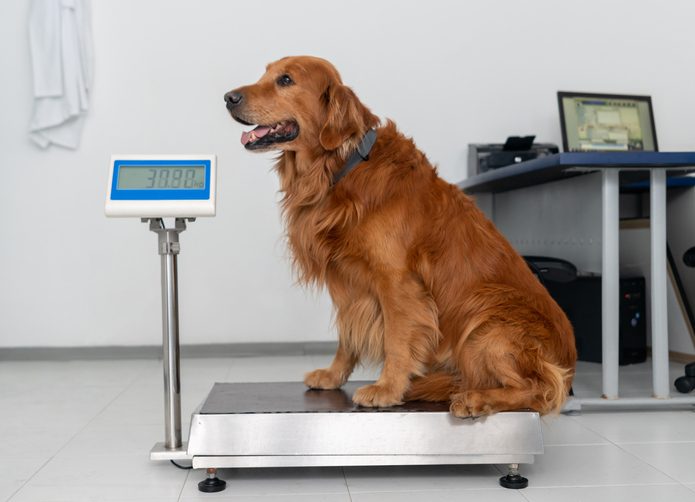Why Is My Dog Gaining Weight?
It’s natural to feel concerned if you notice your furry family member gaining weight. There are many reasons why a dog could pack on extra pounds. Read on to discover the most common explanations that answer the question, “Why is my dog gaining weight?”

Common Causes
Below are the main causes:
Too Many Calories
Just like in humans, excess calories can lead to weight gain in dogs. Those unused calories are converted to fat and stored in the body–which is why it’s important to know how much food to give your dog per day. Your calorie estimate needs to include treats, dry food and wet food in order to be accurate.
Not Enough Exercise
Physical activity is how the body burns calories in both dogs and humans. A lack of exercise or a sedentary lifestyle will increase the odds that your canine will pack on the pounds.
Below are some useful ways to help your canine get more exercise.
A Walking Routine
Walking with your canine at consistent times each day can increase their enthusiasm for exercise. Not only are walks a chance for them to relieve themselves, but they are also moments for increased physical activity and bonding time with you.
Scheduled Playtimes
Just like consistent walks, scheduled playtimes can help them burn off extra calories and have a physical activity they look forward to each day. Fenced yards are great for sprinting and jumping without a leash.
Swimming Sessions
For dogs who like water, swimming can be a great way to get some exercise. Make sure to train your canine how to swim before opting for this option, as not all dogs are naturals in the water.
Playdate
Dogs tend to be more active when there are other canines around. Schedule a playdate with a friend or neighbor if you think your dogs will get along. Alternatively, you may want to consider having more than one dog. This will naturally increase their physical activity through interactive play. By keeping your canine active, you’ll help them maintain a healthier weight.
Low-Quality Food
Low-quality dog food fills the aisles at grocery stores and needs to be avoided. These budget-friendly options often have high-calorie ingredients that are sourced with the intent to keep costs down.
Cutting the budget on quality dog food may increase the costs of medical bills down the road. Not to mention, they may make your dog fatter. Opt for pet store brands that don’t cut corners and use high-quality ingredients to help satisfy your dog with less food and more nutrients.
Your Dog’s Age
With age, a dog’s metabolism slows down. If their calorie intake remains the same, this can lead to weight gain. Additionally, older dogs tend to be less active–which means these excess calories are converted into stored fat.
Dog Breed
Certain dog breeds have slower metabolisms than others. Thus, they are naturally more prone to weight gain. Many breeds have lower energy levels and prefer more sedentary lifestyles. This preference can contribute to weight gain.
Stress Response
Stress hormones such as cortisol can negatively impact a canine’s metabolism. A stressed dog might also eat more, which can lead to stored fat. What’s more, chronic stress disrupts their endocrine system–which can further deregulate their metabolism.
Below are some effective ways to relieve stress in dogs.
Avoid Negative Reinforcement
Punishments can be stressful for dogs and are often not as effective as positive reinforcement. Instead of focusing on your canine’s mistakes, reward them for good behavior and watch as their stress levels decrease.
Create a Safe Space
Creating a space for your dog where they can get away from anxiety-inducing situations can help regulate their stress levels. This approach is useful in a home with children or other pets.
Limit Exposure
If you have observed that certain situations make your dog anxious, limit their exposure to such environments. For example, some canines get nervous around bigger dogs and prefer not to go to dog parks where they have such encounters. Others become stressed in crowds or around fireworks. Avoid or limit such exposure to help your canine regulate their stress.
Desensitization Training
If certain stressful situations are unavoidable, hire a dog trainer for desensitization training. This kind of training can include gradual exposure to stimuli that will help your canine manage triggers more effectively. Observing your dog and noting their triggers can inform your decisions about how to decrease their stress and their waistline.
Medical Conditions
Certain medical conditions can cause weight gain in dogs. Conditions such as hypothyroidism, diabetes and hormone imbalances can affect their metabolism and lead to extra pounds. Adjusting your canine’s diet and increasing physical activity can help to counter the effects of certain medical conditions.
Medication Side Effects
Some medications can lead to weight gain in dogs. This type of side effect is common with medications that cause altered metabolisms, hormone fluctuations, or fluid retention. Consult your veterinarian regarding the potential side effects of any prescribed medications.
Seek Veterinary Care if Your Dog is Gaining Weight
By being aware of why your dog is gaining weight, you can be more prepared to help them with weight management. While weight gain in dogs isn’t always cause for concern, it’s best to err on the side of caution and keep them within their recommended weight range based on their unique characteristics. The bottom line is that a healthy weight can increase your dog’s vitality and make them happier. For more information or if you would like to speak to a veterinarian, contact Veterinary Medical Center of St. Lucie by calling (772) 337-8570. Our team is always happy to help!
